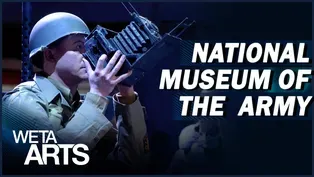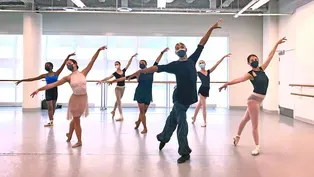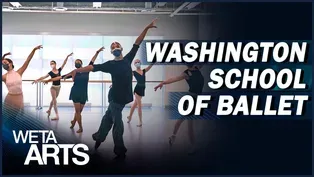
Smithsonian Folkways Celebrates Its 75th Anniversary
Clip: Season 11 Episode 3 | 9m 44sVideo has Closed Captions
Smithsonian Folkways celebrates their anniversary with a creative project.
When you think of the Smithsonian, you might not think Grammy Award-winning record label, but it turns out that Washington, D.C., is home to a highly acclaimed music publisher called Smithsonian Folkways. For their 75th anniversary, they commissioned Baltimore-based experimental electronic music duo Matmos to make an LP using the record label's back catalog.
Problems with Closed Captions? Closed Captioning Feedback
Problems with Closed Captions? Closed Captioning Feedback
WETA Arts is a local public television program presented by WETA

Smithsonian Folkways Celebrates Its 75th Anniversary
Clip: Season 11 Episode 3 | 9m 44sVideo has Closed Captions
When you think of the Smithsonian, you might not think Grammy Award-winning record label, but it turns out that Washington, D.C., is home to a highly acclaimed music publisher called Smithsonian Folkways. For their 75th anniversary, they commissioned Baltimore-based experimental electronic music duo Matmos to make an LP using the record label's back catalog.
Problems with Closed Captions? Closed Captioning Feedback
How to Watch WETA Arts
WETA Arts is available to stream on pbs.org and the free PBS App, available on iPhone, Apple TV, Android TV, Android smartphones, Amazon Fire TV, Amazon Fire Tablet, Roku, Samsung Smart TV, and Vizio.
Providing Support for PBS.org
Learn Moreabout PBS online sponsorshipWhen you think of the Smithsonian, you might not think Grammy Award-winning record label, but it turns out that Washington, D.C., is home to a highly acclaimed music publisher called Smithsonian Folkways, and for their 75th anniversary, they went somewhere you might not expect.
They commissioned Baltimore-based experimental electronic music duo Matmos to make an LP using the record label's back catalog.
We met Matmos outside the Hirshhorn Museum as they prepared for a concert.
We, Matmos, a band of electronic musicians, will be chopping up some of our favorite records from the Folkways label for the next 3 hours, and then kind of spreading the sound out into 8 channels.
This is a very different kind of performance because this is 3 hours long, and my goal is to calm people down and get them to just listen to something very simple and enjoy the space.
I'm worried about the technical stuff being set up on time.
Man on audio: ...lives of John and Mary often... Curry: With a name taken from the 1968 cult classic film "Barbarella," Matmos is known for creating works from unconventional samples.
[Percussive loop playing] ♪ Daniel, voice-over: We made an entire record only out of our washing machine.
Schmidt, voice-over: Only out of medical procedures.
♪ Lately, we've been doing a thing with a Ball jar.
Daniel, voice-over: For us, it's about a curiosity in sounds themselves.
[Squeak squeak] [Sample playing] Schmidt, voice-over: You can slice, pitch-shift, stretch practically any sound.
[Clicking] Daniel: And now bring in the frogs.
Daniel, voice-over: What we tend not to do, though, is to sample old records, which is why it was quite unusual for us in terms of our practice to be asked by Smithsonian Folkways to make an entire album out of their past.
Lead Belly: ♪ Let the Midnight Special... ♪ Curry: The cornerstone of the Smithsonian Folkways collection is the Folkways record label, which the Smithsonian acquired in 1987.
Folkways was started-- it was a man named Moses Asch in New York City.
He'd been a radio engineer, and he lived in an incredibly Jewish neighborhood.
People were requesting records of Jewish music, cantorial stuff and things in Yiddish, and they couldn't get them, so just as a service for the neighborhood, he actually started making these Jewish records... Abraham Brun: [Singing in Hebrew] ♪ Place: and then he put out a French poetry record.
Paul A. Mankin: [Speaking French] Place: Then he discovered Lead Belly, this great folk singer.
♪ Irene, goodnight... ♪ Place, voice-over: Next thing you know, he has a company called Asch Records.
He's putting out music from all over the place.
That label went out of business.
[Record scratch] You got another one called Disc label, which went out of business... [Record scratch] and the third time was the charm, 1948, started what he called Folkways Records & Service Corporation, creating things for schools and libraries.
Narrator: ...called a stylus is adjusted... Curry: Smithsonian Folkways is best known for the traditional music in the catalog.
Woman: We have people who love Woody Guthrie... Guthrie: ♪ This land is your land... ♪ Woman: Pete Seeger... Seeger: ♪ If I had a hammer ♪ ♪ I'd hammer in the morning... ♪ We have people who are really interested in our Indonesia series and want to know more about musics from all parts of the world.
Suhaeni: ♪ Na ma'elongi i monge' ya tori'... ♪ We have a really well-loved children's music catalog that's anchored by Ella Jenkins.
Jenkins: ♪ Miss Mary Mack ♪ Children: ♪ Mack, Mack ♪ Jenkins: ♪ All dressed in black ♪ Children: ♪ Black, black... ♪ Place, voice-over: Moe Asch had all these niches.
He dabbled in all sorts of other things, like documenting sounds, and any sound counts.
"Sounds and the Ultra-Sounds of the Bottle-Nosed Dolphin"... [Whistles and clicks] the legendary "Speech After Removal of the Larynx."
Man: [Distorted] This new method of speech... Place: Here you have "Sounds of the Office," sounds of typewriters and rotary-dial phones and all sorts of stuff.
Thing about Moe Asch you have to understand, Moe Asch and Folkways, is, his audience was, like, universities and schools.
He might go to a science convention, and a professor'd come up and say, "I need 30 copies of this thing for my class," and he'd make, like, 100 copies.
Daniel, voice-over: We knew pretty early on that we weren't interested in kind of unsanctioned remix of somebody else's music, that it would be more fun for us to go to the corners of the catalog that are quite obscure.
Schmidt: "The Sound of North American Frogs."
[Frogs croaking and chirping] Daniel: The Sounds of the Ionosphere"... [Static and thrumming] "The Voice of the Storm"... [Thunder] you know, these odd records that kind of teeter between popular science education and relaxation and sort of tourism of the ears.
Charles M. Bogert: Tree frog voices are very different in quality from those of the pig frog, which has internal vocal sacs.
[Pig frog croaks] I really love this pig frog.
This is a mating call of a pig frog... [Pig frog bellows] so much personality, you know, so much character in just this one little animal, so it deserves to be the kind of lead singer of the virtual band.
The call of the wild... ...pig-nosed frog.
"Mwah.
I love you."
Ha ha ha!
[Percussive loop and frog croaks playing] ♪ Daniel, voice-over: I think in some ways, it was the "Anthology of American Folk Music" that had connected us to the idea that there was something raw and direct in that traditional music that we might have access to.
I see noise music as the folk music of this century.
♪ Part of our mission is to make sure that we are filling the mosaic of all the different sounds of the world.
The Matmos album is a natural fit for our catalog.
Man on audio: [Echoing] Hello.
Hello!
Loughran, voice-over: The upcoming concert's going to be really interesting live demonstration of what the creation of this sound is like.
Daniel: Hello, Washington, D.C.
I'm Drew Daniel, and I'm half of Matmos.
We're very grateful to Folkways Records and the Hirshhorn for making this possible.
We encourage you to walk around the space.
Schmidt: The place you're supposed to listen is actually inside the big circle.
This isn't just running stereo into 8 speakers.
There's different program material in all 8 speakers, hence octophonic.
As far as I'm concerned, you can drag your chairs out there.
I suspect that's OK. Just don't leave with the chairs, right?
Thanks for coming and enjoy the sounds of Folkways.
[Frogs chirping and croaking] ♪ Schmidt, voice-over: It may seem excessive to use 8 speakers when we only have two ears, but, in fact, our hearing is a lot more complicated than that, and I have found that the more speakers you add to a situation, the deeper the sound is.
[Sounds, voices, and percussive loop playing] ♪ Man on audio: Vibrating violently... ♪ ...the sound.
We hadn't intended to stay the whole afternoon, but the sound was compelling.
[Metallic tapping] [Engine thrumming] [Cacophony] Woman: The sounds that you hear are different wherever you're placed.
[Insects and birds chirping] ♪ Woman: I have not heard them before this event occurred, and now I'm gonna add them to my Spotify playlist.
Daniel, voice-over: I hope it makes them more curious about noise and sound.
I hope it makes them start hunting for weird old records and start making weird new records.
♪ Loughran, voice-over: This archive of sound tells us who we are at a certain moment in time, gives us a lot of opportunity to think creatively about what it is that the catalog should include in the future.
[Static] Daniel: Thank you very much.
[Cheering and applause] Ha ha ha!
Curry: If you want to listen to more of Matmos' album, it's available at folkways.si.edu.
That's where you'll find all of the Smithsonian Folkways catalog, with music and sounds from around the world and right next door, as well as playlists, podcasts, lesson plans, and more.
Behind the Scenes at the National Museum of the Army
Video has Closed Captions
Clip: S11 Ep3 | 7m 57s | Felicia Curry talks with museum director Tammy Call. (7m 57s)
Preview: WETA Arts November 2023
Preview: S11 Ep3 | 30s | Smithsonian Folkways; Washington School of Ballet; National Museum of the U.S. Army (30s)
Washington School of Ballet Adult Program
Video has Closed Captions
Clip: S11 Ep3 | 8m 42s | The Washington School of Ballet offers open classes for adults at all skill levels. (8m 42s)
Providing Support for PBS.org
Learn Moreabout PBS online sponsorshipSupport for PBS provided by:
WETA Arts is a local public television program presented by WETA














